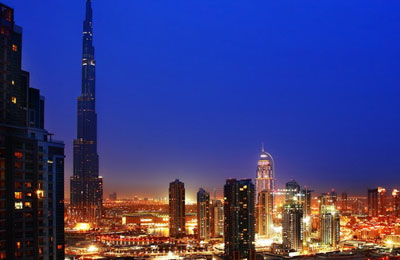
Dubai ‘most attractive for private investors’
Riyadh, December 9, 2012
Dubai remains the most attractive destination to private investors within the GCC region, according to findings released by Cluttons in its first Middle East Private Capital Survey.
The report set out to examine investor sentiment within the Arabian Gulf region, specifically intra regional investor sentiment, attitude and behaviour of high net worth individuals (HNWI) in Abu Dhabi, Dubai, Manama, Muscat and Riyadh, a statement from the real estate company said.
The report also found Riyadh and Doha emerging as strong secondary and tertiary target locations, respectively.
Despite Eurozone uncertainty dragging down the performance of the broader global economy, the Middle East is the only global region to have recorded positive growth in total HNWI wealth from 2010 to date, the statement said.
This corresponds with IMF predictions of an average GDP growth of 3.4 per cent across the region next year and expectations for Gulf countries to outperform major western economies.
It is therefore unsurprising that the number of HNWI looking to invest regionally is 60 per cent higher than in 2011, and that 80 per cent of those surveyed are very likely to make an investment in the region during 2013.
Dubai emerged as the top investment target for both investors from the UAE and those from all other cities surveyed, with 80 per cent of HNWI very likely to make an investment in Dubai during 2013. Within Dubai itself, HNWI interests are split across several sectors: residential (40 per cent), hotel and leisure (40 per cent) and retail and malls (20 per cent).
Typical budgets for Abu Dhabi’s HNWI seeking residential assets in Dubai range from Dh50 million ($18.8 million) to Dh80 million, with multi-storey G+8 to G+12 tenanted residential buildings which contain some mixed-use and good covenants, topping wish lists.
Aside from Dubai, Saudi Arabia’s residential market (20 per cent) and Doha’s office (7.5 per cent), hotel and leisure sectors (7.5 per cent) remain high on the lists of Abu Dhabi’s HNWI.
For investors based in the Bahraini capital, Riyadh’s residential market (15 per cent) and Doha’s residential, office and hotel and leisure sectors (5 per cent each) are also of high importance. For HNWI from Muscat industrial assets in Riyadh (20 per cent) and Doha’s hotel and leisure sector (15 per cent) come second to Dubai.
After Dubai, Saudi Arabia emerged as the next most desirable investment destination for the region’s HNWI, with those in Abu Dhabi (20 per cent) and Manama (15 per cent) stating that residential property in Riyadh was high up on their target lists, while the Saudi capital’s industrial assets topped Muscat’s HNWI interests (20 per cent). 60 per cent of Riyadh-based investors identified Dubai’s residential, office and hotel and leisure sectors as sought after asset classes.
The abolition of all restrictions on foreign property ownership in May 2012 has helped to propel Istanbul on to the radars of the region’s HNWI, with 60 per cent of those surveyed naming the Turkish capital as an emerging destination of high interest.
Doha, which was awarded the right to host Fifa’s World Cup 2022, is also experiencing an upturn in investor interest as the country plans to undertake up to $150 billion of infrastructure development over the next 10 years in the run up to the event. Specifically, the Qatari capital’s residential and hotel and leisure sectors are of particular interest for the region’s HNWI, according to the survey.
Ian Gladwin, CEO at Cluttons, said: “Dubai’s improved attractiveness, as a result of the regional geopolitical tensions, coupled with the emirate’s economic recovery has in effect created a ‘perfect storm’, which Dubai is benefitting from tremendously.”
“It is clear that real estate assets continue to take precedence when it comes to regional investment activity. That said, given the ever changing economic climate, coupled with the long lasting effects of the ‘great recession’, a clear strategy focussed on building diverse asset portfolios within the Middle East is beginning to emerge, with the region’s stock markets, alternative investment funds and gold helping to balance out investors’ portfolios,” he concluded. – TradeArabia News Service







